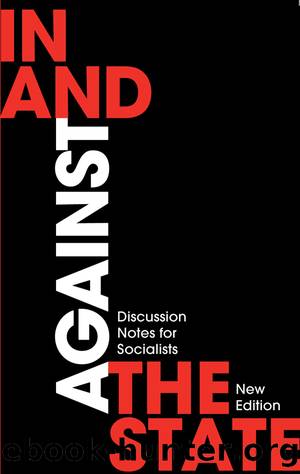In and Against the State by Group London Edinburgh Weekend Return;Wheeler Seth;Holloway John;

Author:Group, London Edinburgh Weekend Return;Wheeler, Seth;Holloway, John;
Language: eng
Format: epub
Publisher: Pluto Press
The family is at the core of the state to an extent that we rarely realise.
What these three examples illustrate is that the emergence of the Keynesian mode of domination involved in many different ways the development of new forms of struggle by the bourgeoisie, of new ways of dividing and atomising the working class. These forms of struggle, these new relations established between capital and labour are not only an indirect response to working class struggle, they also inevitably shape that struggle and call forth new forms of organisation, just as inevitably as, in a war, the development of new methods of warfare by one army imposes, willy nilly, new methods upon the other. One consequence of the neglect by marxist theory of the analysis of this historical development of everyday relations between the state and the working class is that there has been little attempt to understand these changes in organisational form.
It is a commonplace to say that Keynesianism is now in crisis. From our perspective, two points are essential in considering this crisis. First, the crisis of Keynesianism is a crisis of capital. Secondly, if we think of Keynesianism not as a set of policies, but as a particular form of dominating, atomising, disarming the working class, then we must not think of the crisis as simply an attack on working class living standards (although this is important). The crisis is also a restructuring of the way in which class conflict is filtered and defined. We need to remember this if we are to develop appropriate ways of combatting the smothering of conflict which keeps capitalism alive.
The crisis dawned in Britain about 1960. During the 1950s the favourable conditions of accumulation established through the experience of fascism and war allowed the apparent reconciliation of conflicting âinterestsâ by relatively harmonious means and without any major disruption of the established pattern of social relations. From 1960 onwards the clear decline of profitability first in the British and then later in the decade in the world economy made the restructuring of the relations of production increasingly difficult. But at the same time the balance of class forces was such that a radical abandonment of the Keynesian mode of domination was impossible. The result has been a compromise: not a sharp abandonment of the Keynesian mode of domination but its gradual transformation. If originally Keynesianism involved the attempt to reconcile conflicting âinterestsâ through a combination of institutionalisation and concession, since 1960 the emphasis within this indissoluble combination has been increasingly placed upon institutionalisation with only minimal concession â necessarily so, given the imperatives of capital restructuring.
The compromise reached through this shift in the nature of Keynesianism has not been entirely satisfactory from the point of view of capital. Certainly, massive capital restructuring has taken place. Inefficient firms have gone bankrupt or been taken over by bigger firms: the number of company liquidations more than doubled between 1973 and 1975. The more successful firms have survived by ârationalisingâ their workers into unemployment. The number of people unemployed has soared to its highest level since the 1930s.
Download
This site does not store any files on its server. We only index and link to content provided by other sites. Please contact the content providers to delete copyright contents if any and email us, we'll remove relevant links or contents immediately.
The Secret History by Donna Tartt(16661)
The Social Justice Warrior Handbook by Lisa De Pasquale(11494)
Thirteen Reasons Why by Jay Asher(7801)
This Is How You Lose Her by Junot Diaz(5799)
Weapons of Math Destruction by Cathy O'Neil(5046)
Zero to One by Peter Thiel(4834)
The Myth of the Strong Leader by Archie Brown(4795)
Promise Me, Dad by Joe Biden(4455)
Beartown by Fredrik Backman(4433)
Stone's Rules by Roger Stone(4422)
How Democracies Die by Steven Levitsky & Daniel Ziblatt(4414)
The Fire Next Time by James Baldwin(4350)
100 Deadly Skills by Clint Emerson(4085)
A Higher Loyalty: Truth, Lies, and Leadership by James Comey(4039)
Rise and Kill First by Ronen Bergman(4020)
The David Icke Guide to the Global Conspiracy (and how to end it) by David Icke(3891)
The Farm by Tom Rob Smith(3878)
Secrecy World by Jake Bernstein(3788)
The Doomsday Machine by Daniel Ellsberg(3737)
